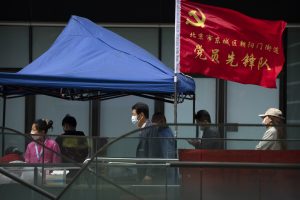China’s fight with COVID-19 has entered a new round. Following the country’s most severe outbreaks since the start of the pandemic, President Xi Jinping has instructed officials to double down on his signature “zero COVID” policy of strictly testing, tracing, and isolating positive cases. Drawing on Mao-era terminology, Xi declared that “perseverance is victory” in what he has dubbed a “people’s war” against COVID-19.
Xi’s latest words also signal an unprecedented level of political sensitivity around his maximum suppression strategy. In a warning against dissent, Xi called on officials to “resolutely struggle” against those who “distort, question or negate our nation’s pandemic containment policies,” conveying a distinctly nationalistic tone. This comes amid growing criticism of Beijing’s zero-tolerance approach from both domestic and foreign observers.
Numerous prominent figures have recently been censored after making bearish comments about China’s economy or questioning the legality of hardline measures. Even the director general of the World Health Organization has now become a victim of Beijing’s wrath, after he said that zero COVID was unsustainable.
At the same time, foreign business sentiment has been rapidly declining. The number of European companies that are considering divesting from China has more than doubled since the beginning of 2022. Meanwhile, Japanese brokerage firm Nomura has identified zero COVID as the dominant obstacle to growth in China.
The language of Xi’s recent warning also suggests that there is some divergence on zero COVID within the Chinese Communist Party. Speaking to the Politburo Standing Committee on May 5, Xi’s comments were notable for making no reference to the economic disruption of lockdowns. This contrasts with earlier Politburo statements, as well as recent comments by Premier Li Keqiang and Vice Premier Hu Chunhua.
Xi has sent a clear signal that he ultimately considers COVID-19 mitigation to be an even higher priority than the economy. This prompts an important question: Given all of the growing opposition and mounting economic disruption, why does China’s leader still feel the need to stick with such strict containment measures?
As I have explored before in The Diplomat, one reason is a narrative of systemic superiority that Beijing developed after its earlier success at suppressing COVID-19. It would also be a significant risk for Xi Jinping to change course during this politically charged year, in which he is expected seek a convention-breaking third term in power.
But Xi’s renewed commitment to zero COVID makes sense for another reason. During almost a decade in power, China’s leader has repeatedly shown a willingness to deprioritize economic growth in favor of political and social issues that he considers more urgent. Last year’s “common prosperity” campaign to redistribute wealth is a case in point, while efforts to alleviate rural poverty and protect the environment also fit this calculus.
So far, these initiatives where Xi has sacrificed growth have been facilitated by a clear socio-political rationale, strong stakeholder support, and a stable economy. But zero COVID is now increasingly unable to depend on such favorable conditions. As the virus has become less deadly but more infectious, the logic of continuing with strict containment has weakened, support for the policy has waned, and the health of China’s economy appears to be rapidly deteriorating.
This should be troubling for the Chinese president. The economy is a key political battleground in any country, but especially China, where consistent growth has been a major source of political legitimacy since the late 1970s. Xi knows this, and his administration has generally shown that it will fight political battles only where there is the economic cushion to do so.
Last year’s regulatory crackdown exemplifies this political-economic interplay. Though hugely disruptive, the intervention was practicable because of the economy’s relatively robust condition at the time (as an April 2021 statement made clear). Many citizens and officials voiced support for efforts to rein in monopolistic and invasive corporate practices. As growth has weakened, however, priorities have shifted, and Xi’s government appears to have paused its campaign against the “disorderly expansion of capital.”
So when might we see a similar inflection point in the calculus of zero COVID? Many are expecting a relaxation following the 20th National Party Congress, which recent precedent suggests may happen this October or November.
But while the Party Congress is no doubt hugely important, any U-turn on zero COVID may depend in large part on China’s macro-economic performance. Xi’s record suggests that he will only sacrifice growth up to the point that it does not threaten stability. And while first quarter indicators largely held steady, recent figures for exports and employment are painting an increasingly bleak picture of China’s economy.
If activity remains depressed over the next one or two quarters, the economic and social effects would start to be felt much more acutely. It is precisely this sort of politically destabilizing scenario that Xi needs to avoid and that could ultimately force him to change direction on zero COVID.

































